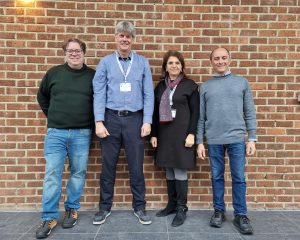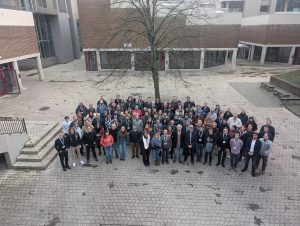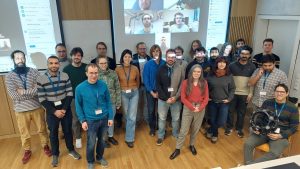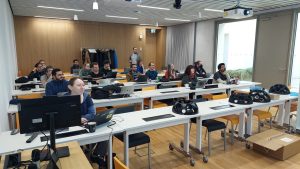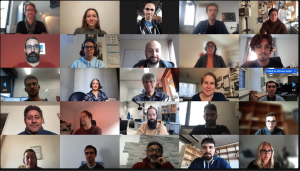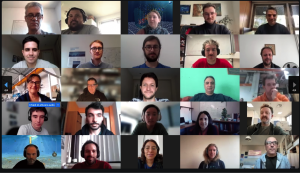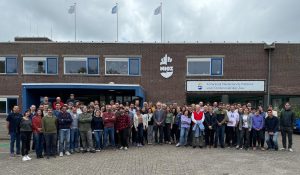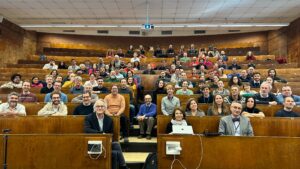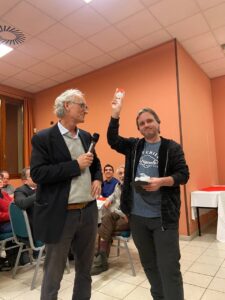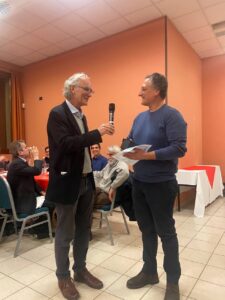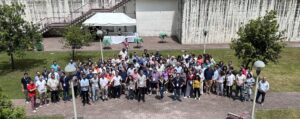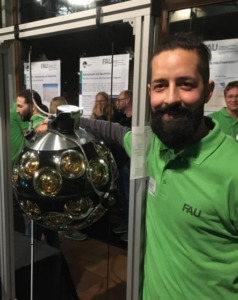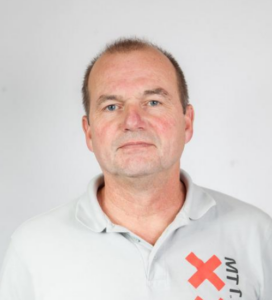13 December 2024 – During the last Collaboration meeting, the KM3NeT Collaboration has elected a new Management Team, who will serve for the two coming years. In addition to the new Institute Board Chair, prof Antoine Kouchner from UPCité, France elected last June, the following people will be leading the Collaboration as:
- Spokesperson: Paul De Jong (Nikhef and University of Amsterdam, The Netherlands)
- Deputy Spokesperson: Damien Dornic (CPPM/CNRS, France)
- Physics and Software Manager: Rosa Coniglione (INFN-LNS, Italy)
- Technical Project Manager: Antonio D’Amico (Nikhef, The Netherlands)
The transition from the current to the new Management Team will happen at the next Collaboration meeting at the end of January, celebrated with presents and pictures! Stay tuned!
Curious about who are the people behind the researchers? We asked them to share a few words about themselves!
Paul De Jong – Spokesperson:
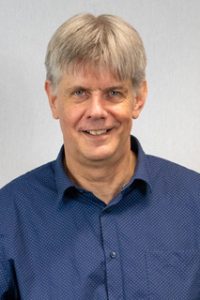
“I studied Applied Physics at the Twente University of Technology in Enschede, the Netherlands, and did my PhD at Nikhef and at the University of Amsterdam in the ZEUS collaboration at the HERA collider at DESY in 1993, on calorimeter construction and reconstruction software, and measurement of the hadronic energy flow in first HERA data.
I was then a postdoc in the L3 Collaboration at LEP, first employed by MIT, later as a CERN fellow, on the commissioning of, and track reconstruction software for, the newly installed endcap muon chambers on the L3 magnet doors. I worked on the Z-line shape in dimuon decays and on W physics (triple gauge couplings and mass) at LEP 2. I returned to Nikhef in 1999 with a sponsored tenure-track position, joined D0 at the Tevatron (electron reconstruction and top physics) and ATLAS at the LHC, where I spent most time, in construction of the silicon strip detector endcaps and their commissioning, and in searches for supersymmetry in ATLAS data.
I got tenure at Nikhef in 2003, was appointed professor at the University of Amsterdam (UvA) in 2008, and full professor in 2012; I served as the director of the (astro)particle physics division (IHEF) of the UvA Institute of Physics between 2015 and 2024, and as director of the full UvA Institute of Physics between 2017 and 2022. I have handed over the Nikhef KM3NeT group leadership to Dorothea Samtleben last year, and the directorship of IHEF to someone else this summer.
With KM3NeT we have embarked on an amazing project. It resonates with everyone I talk to, from the general public to students to people at funding agencies. We have employed more than 50 detection units and produced first results, and the discoveries coming not only show how well the detector works, but also how much there is still to explore in our field.”
Fun fact about Paul: He was member of the Particle Data Group where he co-authored several instances of the Review on Experimental SUSY Searches in the Particle Data Book!
Damien Dornic – Deputy Spokesperson:
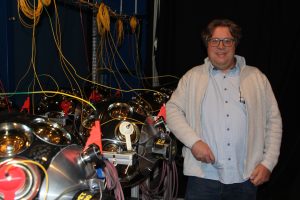
“I began my career as PhD student at the Pierre Auger Observatory before joining the ANTARES and KM3NeT collaborations in 2006, where I pursued two postdoctoral positions, first at CPPM in Marseille and then at IFIC in Valencia. In 2011, I was appointed a permanent research position at CNRS. During this period, I have acquired expertise in neutrino astronomy. I was coordinator of the multi-messenger analysis group in ANTARES between 2012 and 2017 and coordinator of the multi-messenger and transient analysis group in KM3NeT between 2017 and 2020. Between 2020 and 2025, I was the co-convener of the astronomy group of KM3NeT. I am also in charge of the implementation of the real-time analysis framework in KM3NeT. I have been a pioneer in the development of the neutrino follow-up program of ANTARES and have developed collaborations with plenty of international observatories.
Fun fact about Damien: Beyond his work in neutrino astronomy, Damien is also involved in the construction of the ORCA detector, contributing to technical discussions and the integration of detection units!
Rosa Coniglione – Physics and Software Manager:
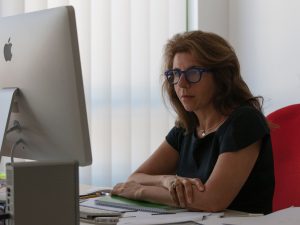
“In the first part of my career, I worked on experimental nuclear physics, spending many years developing and operating an apparatus to study heavy-ion collisions. A seminar at my institute opened up a new world for me: I was captivated by a new, at least for me, detector that employed particle physics technology to explore the cosmos. Inspired by this idea, I began my work with KM3NeT.
Since the inception of the Collaboration, I have dedicated all my time to KM3NeT. I contributed to the ARCA detector design through MC simulations and participated in the initial sensitivity estimates. For many years, I led the Astronomy group and oversaw data analysis since the early stages of the Collaboration (first for the prototype detection units and then during the initial phase of construction of the apparatus). I have served as the Deputy Spokesperson of the Collaboration for the past four years.”
Fun fact about Rosa: Despite being born in Sicily, she worked for many years in France before joining KM3NeT. She is as passionate about Paris as about neutrinos!
Antonio D’Amico – Technical Project Manager:
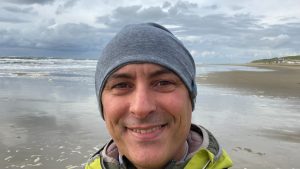
“My engagement with KM3NeT started in the early stages of the project and consisted of developing an optical transmission system for a future submarine neutrino detector. During the following 10 years, I was involved in the design of the various detector prototypes, along with their installation and commissioning.
Since 2011, I have been part of the design team of the optics work package, which I later coordinated from 2018 to 2022 as a member of the Project Steering Committee. During the same period, I have been responsible for the design, validation, procurement, installation, and commissioning of the optical transmission system of KM3NeT Phase 1.
Starting in 2019, the structure of the project coordination has been experiencing profound changes with the full establishment of the Project Office team, in which I was appointed as Project Control Officer (PCO) in 2022.”
Fun fact about Antonio: Antonio has been a member of KM3NeT since his master thesis, learning from, growing with and now leading the Collaboration!
